2020 Lake Erie Region Vegetable Meeting
Event Details
Date
February 20, 2020
Time
8:00 AM breakfast, 8:45 AM - 12:00 PM program
Location
Langford Fire Hall
3901 Langford Rd
North Collins, NY 14111
Cost
FREE!
Pre-register for breakfast.
Host
Cornell Cooperative Extension and Timac Agro USAElizabeth Buck
585-406-3419
email Elizabeth Buck

At this meeting co-hosted by Timac Agro USA and Cornell Cooperative Extension, representatives from IVA Sprayers, BASF, Timac Agro USA, and Gowan will share information about their product offerings and how to use them on specialty crops. Dr. Chris Smart from Cornell will discuss sanitation and prevention techniques for greenhouse and transplant handling to minimize bacterial diseases in peppers and tomatoes. Dr. Lynn Sosnokie, Weed Scientist for Cornell, will lead a focus group to identify grower research priorities. Additionally, Sosnoskie will provide insights on how to recognize herbicide resistance and adjust weed management strategies appropriately.
AGENDA
8:00 AM Welcome Breakfast
8:50 AM DEC Credit sign-up, Introductions, Housekeeping
9:00 AM IVA Sprayers - What we offer
Dale Martin, IVA Sprayers -- This session will provide an overview of sprayer offerings for the specialty crop market.
9:15 AM BASF Products for Specialty Crops
Kate Wheeler, BASF -- This session will provide a technical overview of BASF's herbicide, fungicide, and insecticide offerings for the vegetable and fruit markets. Kate will cover application rates, timing, target organisms, best use recommendations, resistance management strategies, WPS, safety, and label review for these products.
9:45 AM Soil Health and Improved Plant Nutrition
Brendan Knoll & Isaac Harrington, Timac Agro USA -- TIMAC Agro USA an environmentally responsible company with global experience & research, providing local field support with hands on agronomic solutions, through the use of innovative Products that improve soil health, increase nutrient efficiency and reduce plant stress. Brendan Knoll will present Humistart Fertilizers and Excelis Maxx for Improved Soil Health and Soil Nutrition Efficiency. Isaac will present Fertiactyl and Fertileader with Improved Soil and Foliar Nutrition for production from planting to crop finish.
10:15 AM Gowan Products for Specialty Crops
Dr. Dave Pieczarka, Gowan USA -- Dave will discuss three organic and three conventional crop protection products offered by Gowan. He will cover appropriate target organisms, application rates & timings, and worker safety information for each material. Both fruit & vegetable products will be discussed.
10:45 AM Stretch Break
10:55 AM Managing Bacterial Diseases in Peppers and Tomatoes
Dr. Chris Smart, Cornell University -- Bacterial Spot and Speck are difficult pathogens for tomato and pepper growers. This talk will emphasize sanitation and prevention techniques for greenhouse production and transplant handling, as well as discuss plant-pathogen biology and in-field disease epidemiology. Technical information on how to maximize control efficacy using traditional and new products and cultural techniques for the field and greenhouse will be presented.
11:05 AM Weed Management Focus Group
Dr. Lynn Sosnoskie, Cornell University -- Lynn Sosnoskie is an experienced weed scientist who brings a wealth of energy and knowledge to her new role with Cornell University. She is seeking grower input regarding research and extension priorities as she develops her program.
11:20 AM Geospatial Mapping as a Soilborne Disease Management Tool
Elizabeth Buck, CCE Cornell Vegetable Program -- GIS technology has become an affordable technology that can interface physical, historical, and scouting data at the field and farm level. This project assessed whether GIS mapping to track the distribution, progression, and severity of soil borne disease within vegetable fields could facilitate the development of effective disease reduction management techniques.
11:30 AM Recognizing Herbicide Resistance
Dr. Lynn Sosnoskie, Cornell University -- Though it may sound obvious, herbicide resistance can be tricky to spot. With the introduction of herbicide resistance amaranths to NY, the increasing presence of glyphosate resistant marestail, and long-standing herbicide resistance in common NY weed species, it is important to be able to spot suspected resistance and adjust weed management strategies appropriately.
12:00 PM Adjourn and collect DEC Credits
Attendees seeking DEC credit will be required to provide their DEC Certified Pesticide Applicator ID and/or registration number. Only the attendees who sit for the entire course will be awarded a certificate.
Cost: FREE! Pre-register by February 17 to receive breakfast. Call 716-992-3830.













































